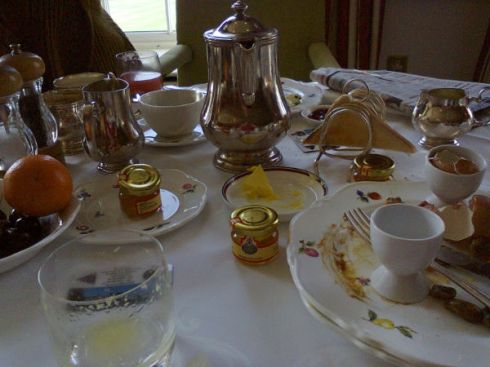Hey Waiter! ? suehealy

Clear that table!
?
I?m sitting in a cafe on London?s Sauf Bank ? because I?m an idiot?. I came down to see a fellow Waterfordian Jamie Beamish perform in the Taming of the Shrew at the Globe ? but only found out on the train that it is a matinee. So, I?ve missed it? Ah well, looks like Jamie and a few other Waterford thesps, including my cousins Michael Power and Des Healy, will be along to the bar soon and it?ll be a Deise arts reunion of sorts? For now, I?m sitting here watching the wheels, or the waiters, go round. And I?m thinking about all the waiting on tables jobs I?ve had in my life.
A wise writer once said to me that it?s not so much the pram in the hall that?s the impediment to a writing career, but the bills on the door-mat. Money worries are the bane of creativity. And unless independently wealthy, the emerging writer will have to make a living while waiting for that book/film deal (and probably for a while after that fact too). Writers need to work; the question is what kind of jobs are out there?
Many will consider other (more lucrative) forms of writing to bring home the bucks. Journalism is an obvious? choice and is still, probably, the most common second career for many creative writers. Moreover, a journalistic background provides marvelous training re editing and brevity of approach. Copy-writing, particularly website copy, is also a popular income?booster for writer but both copy-writing and journalism are less satisfying forms of writing for the creative writer and spending all day writing on the day job can make it difficult to come home and do the same at night.
Teaching English and/or creative writing is another common earner for writers. My TEFL training and experience has given me a sound grip of grammar and the intricacies of the English language ? all of which is of great practical use to a writer. A TEFL teacher also (usually) travels and such experiences can feed into your work. Teaching creative writing allows you to deconstruct the tools of creative writing, which may benefit your own writing. However, you usually need a track record of publication before you begin to look for work in this area.
It is not uncommon for writers to work a mundane job such as on a factory line or as a manual laborer. Such tasks sit quite well with a writing career as they give the writer time to think, to let ideas bubble and boil ready to write down after the shift has finished. Also, with a job so utterly removed from writing, you will be fresh and eager to sit at your laptop of an evening. The downside of any brain numbing, repetitive work is that it has no status. This fact should not be important but it is because writers are human, so for a writer to stay in a lowly job, s/he needs determination, focus and confidence in their reason for doing this type of work.
Writers, of course, come from all walks of life and all career backgrounds. For those of you who may be considering giving up your job to write full time, you need to remember that you?ll (most likely) still need to make a living. Maybe the job you have is not glamorous or interesting, but these are often the best complementary jobs for writing. So, if you really want to be a writer, the greatest sacrifice you make may be NOT giving up the day job -? but staying with it.
I've created this blog to pass on craft tips to both the novice and emerging writer and alert you to competitions or publishing opportunities. .................................................................................................................. ******BIO****** I am a native of Waterford, Ireland and an award-winning short story writer with an M.A. in Creative Writing from UEA.I have over fifteen years experience as a teacher in adult education, which includes time spent as Director of Studies at Budapest International Language School. I lived in the Hungarian capital for eleven years and during that time, edited Hungary A.M. and Expat Echo. I speak Hungarian and French. I presently head the creative writing curriculum at an English prison and have designed and authored the syllabus. I was recently appointed tutor with the Open University, lecturing on their creative writing A215 course. Moreover, I have also worked as an editor, copywriter and freelance journalist since 1994. Additionally, I am an Associate member of the U.K.'s Institute for Learning, the further education professional body. ________________________________________________________ ******AWARDS****** 2012: Shortlisted for the 2012 Fish Short Story Prize. 2011: Won the National Molly Keane Memorial Creative Writing Award. Won the HISSAC Award. Won the Sussex Playwrights' Prize. Highly commended for the New Writer Annual Award. Shortlisted for the Doris Gooderson Short Story Competition. Shortlisted for the Wells Festival Short Story Prize. Shortlisted for the Meridian Award, three times. Longlisted for the Jane Austen Literary Award. 2010: Won the Waterford Annaghmakerrig Award and the Ted and Mary O?Regan Arts Award. ________________________________________________________ *****PUBLICATIONS***** 2011 'A Name in a Cave', 'Duality 6 Anthology. 2011 'Sheila-na-Gig', 'New Writer' autumn edition. 2011 'Snailsock', The Moth, September edition. 2009 'The Shit Princess', UEA Anthology. 2008 'I Am Not A Muse', New Europe Writers Anthology. _______________________________________________________ *****MISC***** During my Budapest years I appeared in the Converging Lines Poetry Festival alongside established poets including Polly Clark, Matthew Hollis, Anthony Dunn, Clare Pollard and Owen Sheers. At present, I am reworking a draft of my novel and putting together a collection of short stories. View all posts by suehealySource: http://suehealy.org/2012/09/08/hey-waiter/
arbor day packers mike adams janoris jenkins john edwards trial brandon weeden felicia day

0টি মন্তব্য:
একটি মন্তব্য পোস্ট করুন
এতে সদস্যতা মন্তব্যগুলি পোস্ট করুন [Atom]
<< হোম